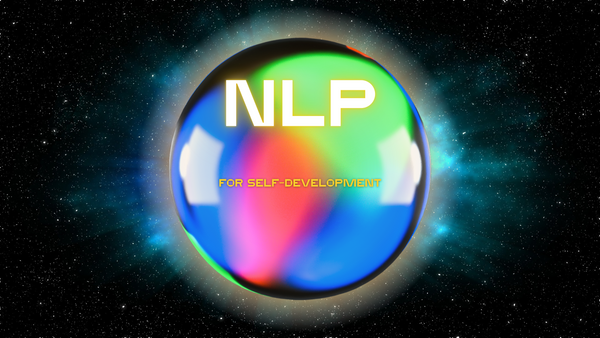Foreword
This is the ultimate guide on how you can harness the power of NLP (Neuro-Linguistic Programming) through self-coaching to achieve what you have always dreamed of.
With this guide, you have a resource compactly summarized and specifically distilled to the minimum from over 6 years of NLP experience and thousands of coaching hours. I have invested over 25,000 euros in personal development (especially NLP training) and want to present you with the most powerful methods in this guide.
My experience with NLP over the last couple of years
I completed my first NLP Practitioner, Master, and Trainer within 1 1/2 years.
NLP for Dummies: 🧠 What is NLP (explained in 4 simple steps)
- Immediately and practically applicable
- NLP or personal development can be applied to all areas of life and improve them.
- The founders of NLP have chosen and adapted the most helpful psychological methods to achieve the maximum and fastest success for coachees.
- NLP is a motivation and communication model that originated in the 70s.
NLP is composed of 3 parts: Neuro - Linguistic - Programming
- Neuro (the nervous system that we use to take in information from the environment)
- Linguistics (language we use to communicate with others externally and with ourselves internally)
- Programming (systematic and targeted change)
Thus, with the help of language, processes in the brain and behaviors are changed.
NLP (neuro-linguistic programming) is the ultimate approach to skyrocket your self-development fast.
If you want to learn how to practically integrate NLP into your life, this is the right blog post to read till the end.
At the end of this post, you will have a basic understanding of Neuro-linguistic programming (NLP), how to use it, and which path to go to learn more.
We will examine the top 3 powerful NLP techniques that have transformed how I look at myself and others. You will even receive a bonus at the end.
🌎 Introduction: What is NLP?
Neuro-linguistic programming (NLP) is a psychological method that focuses on how individuals organize their feelings, thinking, and language. NLP is used as an approach to communication and self-development. It can be used to achieve desired goals, break negative thinking, and discover your true values. It has gained significant popularity because it cured lifelong phobias of individuals in a very short time (often in just one session). NLP was created by Richard Bandler and John Grinder in California. NLP has been used by therapists, coaches, and self-help experts for over 40 years and has helped millions of people worldwide achieve their goals and manage their fears.For the German-speaking Community (!!) -> 🌏 WORLD OF NLP 🌎
Get access to the largest german-speaking and most comprehensive NLP platform ever.
On the platform World of NLP you can playfully collect points while deepening your knowledge about NLP. I have done all my NLP training with this provider and would 100% do it again.
"Over 350 lessons for your personal development, numerous audio recordings and 40 digital NLP books are waiting for you."
The World of NLP offers free webinars to boost your NLP and coaching skills every evening.
✨ The 4 Main Benefits of NLP
In this section, I want to list some the main benefits of practicing NLP.
1. NLP helps you to use positive, reflective, and attractive language.
Did you know we have an inner voice (a submodality) that can influence how we speak to ourselves? For example, you can use the Mickey Mouse Technique, which involves changing the voice in your head (which is most likely dark and deep, at least in my case) to one that sounds like Mickey Mouse. You can find a detailed explanation video on YouTube . (in german)
2. NLP helps you gain inner freedom.
By understanding and changing how you think, feel, and behave, you can overcome negative patterns and behaviors that may hold you back. This can lead to greater fulfillment and satisfaction in life.3. NLP helps you to have a substantial influence on yourself and others.
By discovering your strategies for negative patterns, you gain insight into how to change them. You will better understand yourself and your habits through self-reflection exercises and NLP coaching. You can only influence others if you know how to influence yourself first.4. NLP helps you to free yourself from blockages and destructive behaviors.
By identifying the underlying causes of negative patterns through asking questions, you can break free from them and create lasting change in your life. This can lead to improved health, increased happiness, and more success in all areas of life.You need to get to the root of what’s holding you back and cultivate an overall positive mindset that doesn’t ignore negative emotions, but knows how to control them. - Tony Robbins
How to Practice NLP on Yourself and the Top 3 NLP Techniques
While it is possible to learn NLP on your own, it is often helpful to get training from an NLP Trainer or coach.
In addition, attending workshops and seminars can be a great way to deepen your understanding of NLP. You will learn NLP in theory and practice in groups with different people. If there is one thing I have learned in the NLP courses I have attended, you have only truly understood something if you have applied it to practice.
I personally recommend Landsiedel, which is the biggest NLP Institute in Europe. Also, thanks to Marian Zefferer, I did all my NLP training there (NLP Practitioner, Master, Trainer, and currently the NLP Coach).
A video of me reviewing the NLP Practitioner and Master at Landsiedel
💛 The most transformative strategies and tools from Tony Robbins: Action-oriented summarized, critically scrutinized and compared with other bestsellers by Shortform
If you want to get back immediate Control of Your Mental, Emotional, Physical and Financial Destiny, go to Shortform and skim through their powerful summary on the book "Awaken The Giant Within" by Tony Robbins.
Tony Robbins Number #1 Bestseller "Awaken The Giant Within" has 544 pages.
Shortform gives you the most impactful strategies and methods written on just a few pages. Plus, Shortform focuses on getting you to take action with the knowledge you have acquired after reading their summary.

-> I've been using Shortform for a while and now I’ve partnered with them as an affiliate! Use my link for a 20% discount on the annual subscription. That’s about 2 and half months of the service for free.
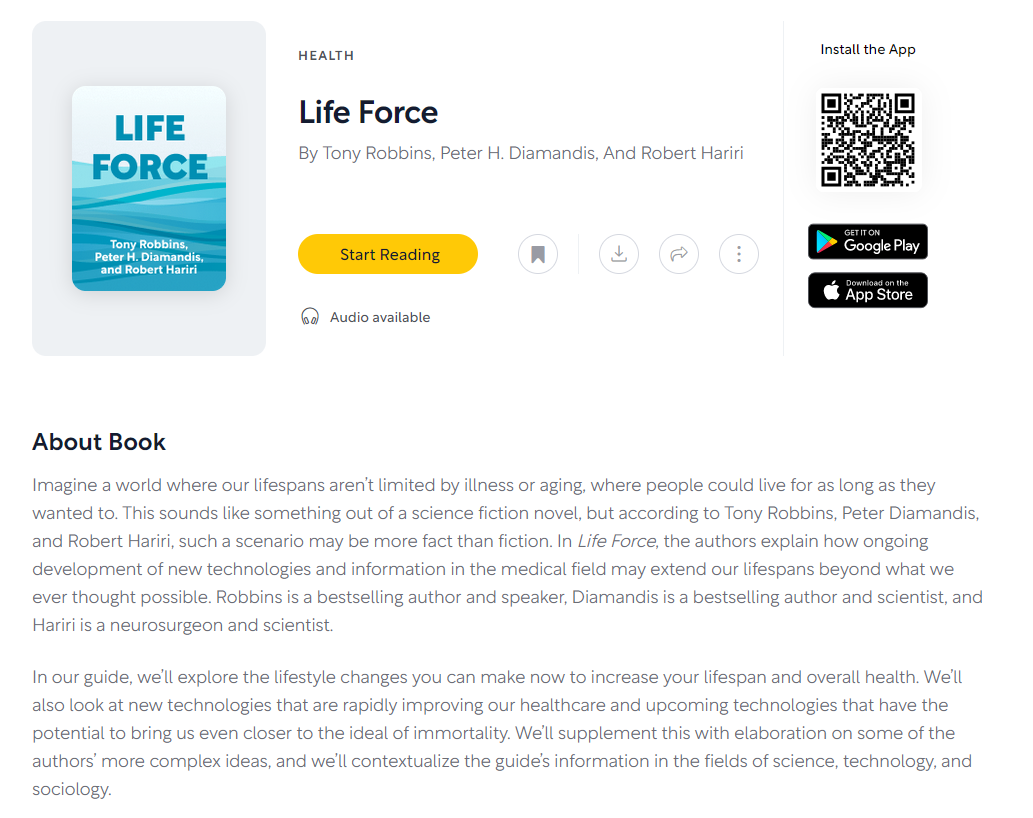
🧙🏼♂️ How to Practice NLP on Yourself
It is essential to know the theory of the techniques and formats, and NLP has much of that.
However, NLP mainly lives from the application. If I had to guess, I would say that the NLP modules in the NLP practitioner consisted of 25% theory and 75% application.
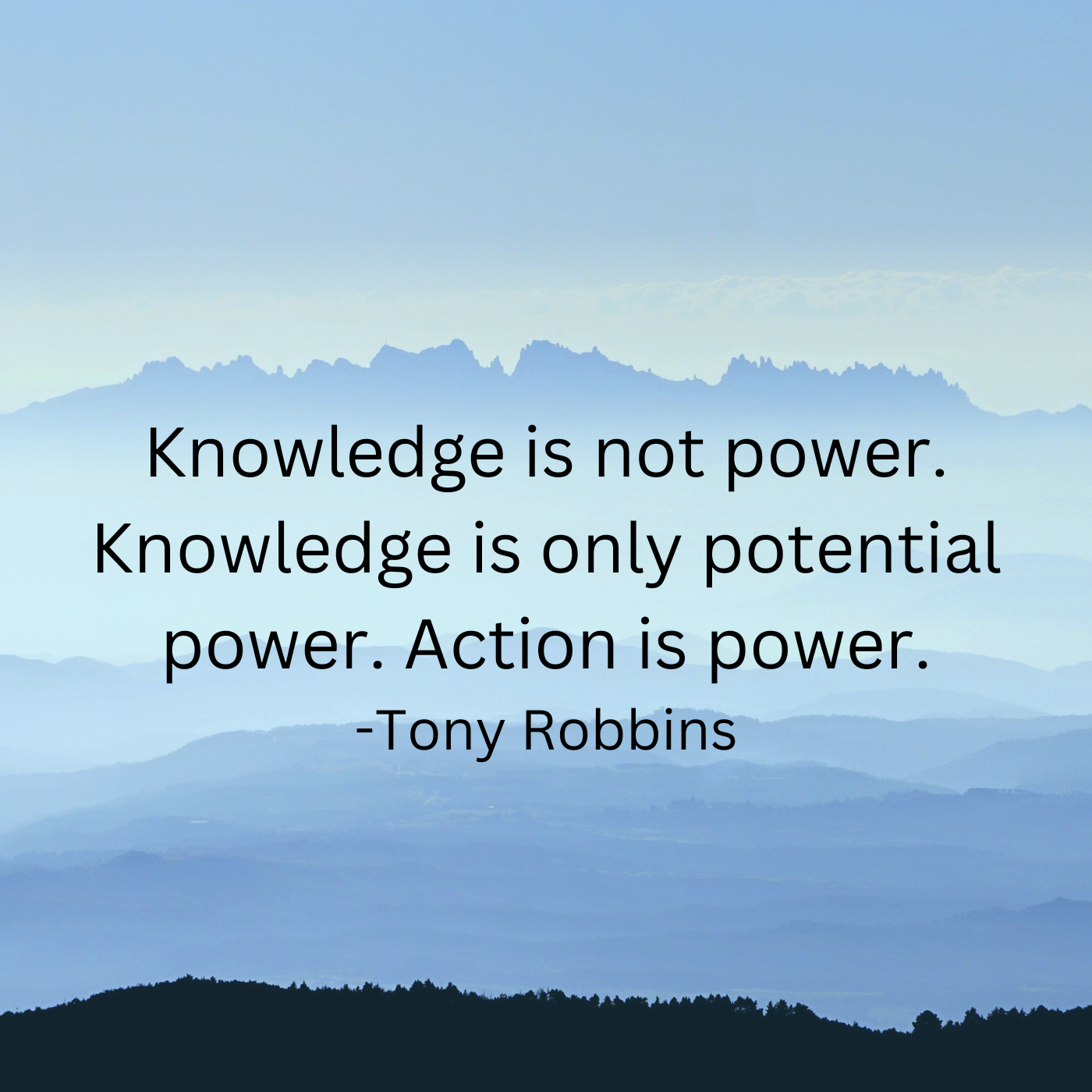
👩🔧 The Top 3 Techniques To Practice NLP on Yourself
Technique Nr. 1: Reflect, reflect, reflect
One of the best ways to learn about yourself is to take some time each day for reflection. As you reflect on your day, pay attention to your thoughts, emotions, and behaviors. What were some of the positive things that happened? What could you have done differently? What did you learn about yourself?Create a diary with a few of your favourite questions for yourself.
If you don't know what to write about, you can read the 3-minute journal, where you will find a template with short and powerful questions. You don't have to take more than 3 minutes to answer them each day.
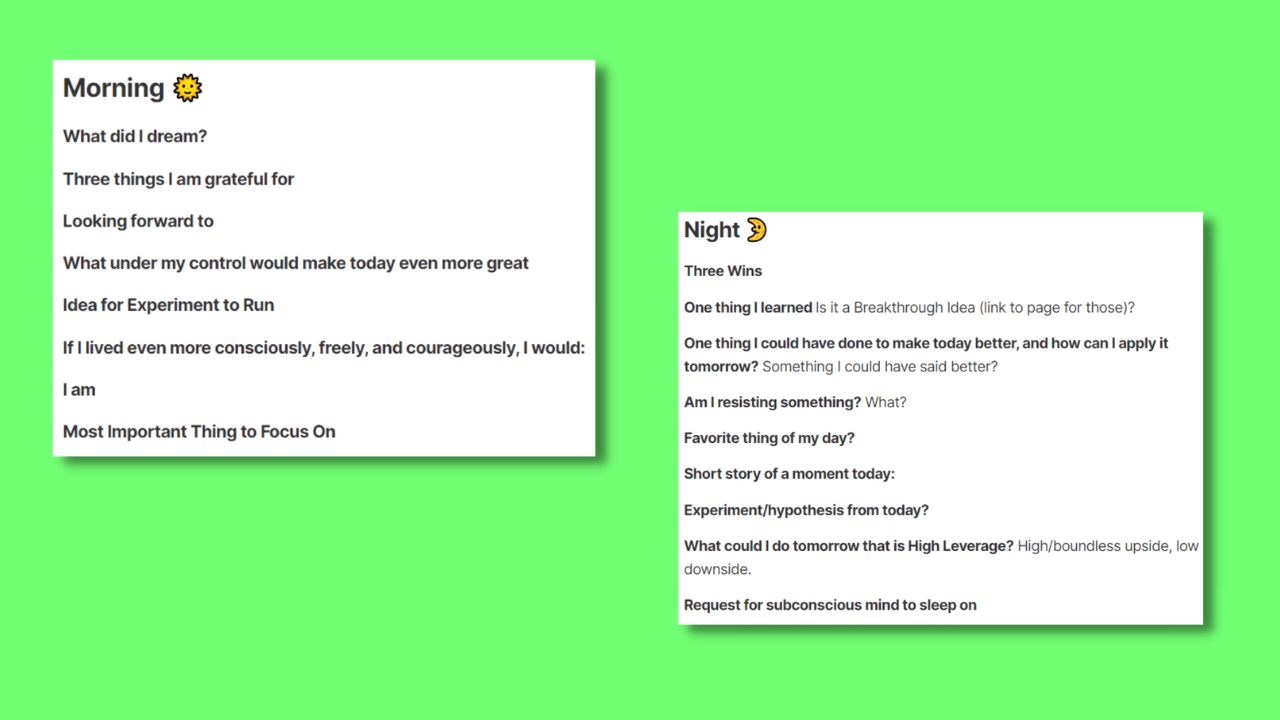
Technique Nr. 2: Action, Make, and Do
Once you have learned some NLP techniques, integrate them into your everyday life. For example, to improve your communication skills, practice mirroring and matching the posture and breathing of the person you are speaking with. People like people who are how they would like to be or who are like them. Elements of mirroring in NLP include the volume and tone of voice, touch, gestures, facial expression, keywords or phrases and much more. To overcome procrastination, set realistic goals and create action plans with specific deadlines. Get yourself into a peak state and go for it. 😎

Technique Nr. 3: Be your own coach
A great way to practice NLP on yourself is to act as your own coach.
Every day, ask yourself what you want to achieve and what steps you need to take to get there. As you progress towards your goals, regularly check in with yourself to see how you are doing and make necessary adjustments. You can also coach other people – friends, family members, and colleagues – using NLP techniques.
This not only helps them achieve their objectives but also allows you to hone your own skills.
🧰 The Top 3 NLP Techniques (In my opinion)
As NLP gathered the best techniques, tools, and formats from client-centered therapy, Gestalt therapy, hypnotherapy, and cognitive science, it is difficult to choose the best three.
However, enclosed, I wrote the three most important skills you can have to change your own and your client's life.
NR #1: 😍 State management
The first step to achieving any goal is getting yourself into the right mind. It will be challenging to achieve anything positive if you're feeling stressed, anxious, or angry. Learning how to manage your state Controlling your thoughts and emotions can be achieved through breathing exercises, a confident posture, meditation, or visualization.
The person living state management is Tony Robbins. He has this article describing how to get into a peak state.
Here you will find everything you need to know about state management, in a short and compact summary I wrote in the latest newsletter edition.

The Tony Robbins Results Coaching
I even did a Tony Robbins coaching with a results coach personally trained by Tony Robbins. It was the most intense coaching session I have ever had.
In just 30 minutes, I knew where I was, where I wanted to go, and what I needed to do to get there. I listed the transformative questions in a blog post and made them publicly available.
🦚 There are only 2 states:
- Beautiful state (high-energy, peak states)
- Suffering (low-energy states)
In the event "Unleash the Power Within," we had to begin to answer the following questions to uplift our emotional state:
- What will a beautiful state give you? Why will you live in a beautiful state in the future, regardless of what might come your way?
- Why MUST you free yourself from all suffering now? How would your life look like if you freed yourself from fear right now?
NR #2: 🗯 Storytelling
Even though storytelling is a "normal" coaching practice, it is one of the most powerful tools we have for influencing others. When you tell a compelling story, you can capture people's attention and imagination and inspire them to take action. I still don't know how my NLP Trainer and Coach does it, but somehow he tells such compelling stories that I cannot do anything other than listen.
After a long day at work on Friday evening, we normally have a 4-hour session with him. I did not know even to digress once. I think he could tell about Martians eating an egg in an underwater submarine, and I would still be fully concentrated on the matter. If anyone knows how he does it, please write me.
“Stories constitute the single most powerful weapon in a leader’s arsenal.” - Dr. Howard Gardner, professor Harvard University
If you want to learn more about storytelling, "Storyworthy", by Matthew Dicks is a great book I recently listened to on Audible. I would 100% recommend this book if you are:
- interested in telling better stories
- like listening to engaging stories
- want to know how to keep listeners glued to your lips
NR #3:❓Questions
Another key tool in NLP is asking questions. Definitely check out the 7 mind-bending questions from the Tony Robbins Result Coaching.Asking the right questions – both of yourself and others – can help you clarify what you want and find creative solutions to obstacles in your way. When trying to achieve something, constantly asking yourself "why" can help you identify your deepest motivation and keep moving forward even when things get tough.
If you are interested in changing your focus to the positive and moving from the problem to the solution, I recommend the post from one of my newsletters, 17 Life-Changing Questions. If you're already on the site, feel free to sign up to receive free weekly self development tips.
💭 5 Quick NLP Interventions to Eliminate Negative Behavioral and Thought Patterns
Maybe you have a belief system that is limiting you. That's perfect for today!
(💖 If you don't have any problems, this method is unfortunately not for you.)
I want to name some examples of belief systems I have heard people share over the years.
- "I am too fat."
- "I'm a failure."
- "I just can't do it."
- "I'm too stupid for this."
Let's take that last sentence for the exercise.
Which negative thoughts about yourself have lately crossed your mind?
The next time a negative belief comes up, ask yourself the following 5 questions. (Those who want to make real progress will probably photograph or copy the questions so they can refer to them when the thought arises.)
😎 Let's begin. Start here.
🦥 Create some emotional distance
"What would (your role model/person who has dealt with a similar issue) do now?" Which posture would she/he have? What would your role model focus on? (The problem? or how to somehow find a way?)
🍰 A part of me ...
One side of me experiences itself as... (stupid).
A part of me experiences itself as ... (stupid) Is there another part, which has a slightly different opinion, maybe?
🖇 Presumption
I am currently still too stupid.
(Because we say the words "currently still", there is the presumption that it can and will change in the future).
🏆 Positive intention
Ask yourself:
"How does this thought want to support me?
If it does not support me, how could it?
What is the positive intention behind it? "
"I am so stupid." Maybe the answer is, "I still have some things to learn."
🔜 Ask about the consequences
How would you feel if you still had the same feeling in a few weeks, months, or even years? What opportunities will you have missed in life?
🔥 [Bonus] + 3 Popular NLP Techniques
This technique creates a positive association (or "anchor") with a certain place, object, or sound.
Whenever you need a boost of confidence or motivation, you can refer to your anchor to help get yourself into a positive state. For example, you might listen to an uplifting song before an important meeting, touch a certain spot on your wrist whenever you need a reminder to stay calm or keep a picture of your goal in your wallet.
Now, you can look at it whenever you need inspiration.
Reframing
This technique involves changing the way you think about an experience or situation.
For example, if you're anxious about an upcoming presentation, reframe it by telling yourself it's an opportunity to showcase your expertise and knowledge. Or, if you make a mistake at work, reframe it by telling yourself it's a learning opportunity that will help you do better next time.
Reframing can help change negative thinking patterns and give you a more positive outlook.
Visualization
This technique involves using your imagination to visualize yourself achieving your goals.
For example, if you're trying to lose weight, visualize yourself eating healthy foods and exercising regularly. Or, if you're trying to get promoted at work, visualize yourself putting in extra effort and impressing your boss with your results.
Visualization can help increase motivation and confidence levels, making it more likely that you'll achieve your goals.
“Becoming the type of person you want to become — someone who lives by a stronger standard, someone who believes in themselves, someone who can be counted on by the people that matter to them — is about the daily process you follow and not the ultimate product you achieve.”
- James Clear, Transform Your Habits
An NLP Roadmap: Where to start and where to go
#1. 👶 NLP Practitioner Training
In the Practitioner, one deal with the basic building blocks of NLP.
When we look at the Dylts Pyramid, the focus is on the bottom 3 layers: Environment, Skills, and Behavior.
You learn methods and techniques and build a good foundation that you can use throughout your career of personal development.
The Practitioner was my absolute favorite training.
😱 Presuppositions NLP
With NLP, I can manipulate people and make them dance like puppets.
With the help of NLP, people do what they want.
With similar beliefs, I signed up for the NLP Practitioner at Landsiedel.
After the NLP Practitioner ...
... and with a completely different attitude.
🌟 My 10 personal highlights of attending the first NLP Practitioner Training
- You learn how to get control over your own emotions
- Each participant gets to fill out an implementation journal reflecting on the following (actually 3 trivial questions, but they make so much difference)
- What successes have you had so far?
- What were your main insights in this module?
- What will you implement, or what will change in your life as a result of this module?
- Timeline work
"It is never too late to have had a happy childhood." - Milton Erickson
7. The power of pattern interruption. If you want to dissolve problems, you don't have to do anything but constantly interrupt the negative pattern.
8. We have learned ingenious language patterns that I often use daily. They help to get your message across and influence the other person's thinking and behavior.
9. Without submodalities, I probably would not have managed to run a marathon. They've helped me tone down strong emotions a few times.
10. Reframing: I love reframing. A few questions you can ask yourself to get a different perspective on your problem:
- What's great about it?
- What do you learn from this?
- What is not yet perfect in the current situation?
- How can you enjoy the process?
Below is the result of a peer group evening on "the power of words." Language is one of 3 elements of how you can influence your state consciously. (according to Tony Robbins) More in this video.

If you speak German and are still considering where to do your NLP Practitioner training, unfold me.
🏆 6 Reasons why I chose to do the first NLP Practitioner at Landsiedel (biggest NLP provider in the german speaking community)
- High value is placed on putting learned models and techniques into practice (successes are documented with the help of an implementation journal).
- Focus on personal issues in peer groups, breakout sessions (coached each other), and live demos
- The CEO Stephan Landsiedel has held the NLP trainer course himself: What inspired me is 1. his story of how he created himself and the brand Landsiedel. 2. how simple and understandable he can explain NLP and psychology.
- The 7 modules are spread over 7 weekends (about every month); they are intensive, and you can deepen your knowledge in between in the weekly peer groups.
- Has constantly co-trainers with whom you can ask questions about content but also personal topics
- If you are looking for an education to relax, to be sprinkled, and to have no problems (that you want to work on), then Landsiedel is not the right place for you.
🤸♂️ Why you'll have more energy after a 20h coaching weekend than before it: Our NLP Practitioner Trainer
Do you know energy zombies? By that, I mean people who suck the energy out of your body.
After you have talked to them, you feel an inner emptiness; you are tired and limp. The trainer, Marian Zefferer, who I had in the Practitioner and Master and now have again in the Coach, is the exact opposite. After his NLP weekends, some of which last over 20 hours, you have more energy, NLP knowledge, and the motivation to try out what you have learned in everyday life.
I also picked up tremendous knowledge in technology and how to properly design online training.
The great atmosphere among the participants and the family atmosphere might make you leave your comfort zone. Read more here.
#2. 🧒 NLP Master Training
The Master consists of a total of 7 modules:
1. Values - is much about self-awareness. You get to know your values better with intensive exercise.
2. Beliefs - using different formats to shake the belief pole, again and again, to pull it out of the ground finally.
3. Hypnosis - Storytelling, Metaphors, Utilization Principle, Language Patterns ... What more could you want? Absolute favorite module!
4. Metaprograms - We have specific thought patterns that determine how we perceive information (structured - optional, rational - emotional, motivated toward something, motivated away from something).
5. Modeling - I want to learn a skill. I choose a model that can do the skill. I look at the model's strategy. I apply it tailored to me.
6. Sleight of Mouth (+Provocative Coaching) - Reframing beliefs, that's Sleight of Mouth.
7. Hypnosystemic approach - You learn how a problem becomes a problem. Goes from the problem to the solution.
#3./#4. 🤴 NLP Coach Training (for one-on-one coaching)
#3./#4. 🤴 NLP Trainer Training (for coaching a group of people)
👁🗨 Vision Board 2023
One way to visualize your goals is with the help of a vision board.
Like the Wheel of Life, I divided my life into different areas:
🗻 Personal development
💘 Friendship/family
🏟 Career
😜 Free fun time
🥦 Health
💸 Finance
The first step in closing the gap, however, is to figure out where you already are. A map can only guide you to where you want to go if you know your precise starting point.
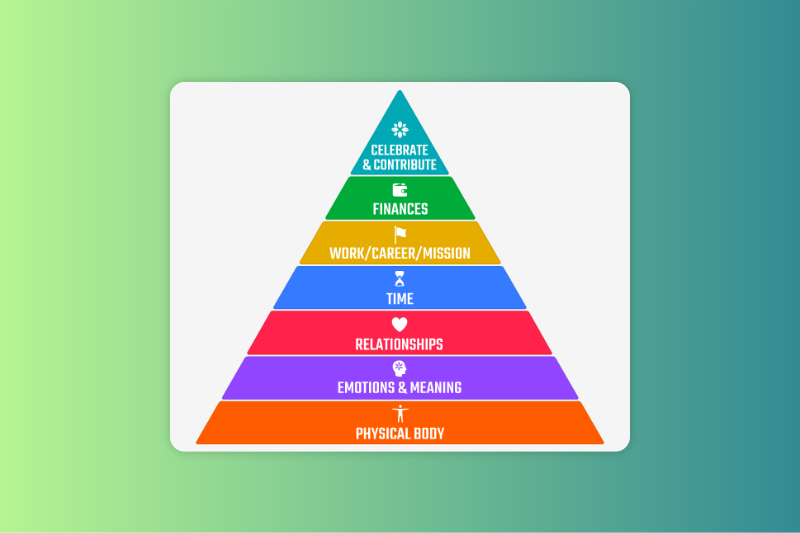
Example: How to get the most out of your 2023 Vision Board
Focus on the 2 most important areas you want to improve this year.
Questions you can ask yourself:
- Where am I right now? Where do I want to go?
- What would a successful person do? What would a healthy person do?
Let's say that your main focus is financing.
- Okay, what mentors can help you?
- What exactly will you do, and how can you measure it?
Write it down.
🎯 Vision Board Continuation
Then, I searched the internet for photos that resonated with me. Whenever I leave my room, I am reminded of my goals.
I also put up some reminders of past successes to remind me of what I have already accomplished.
If you want to do your Vision Board digitally, Canva is a great tool. I honestly just did it with Microsoft Word.
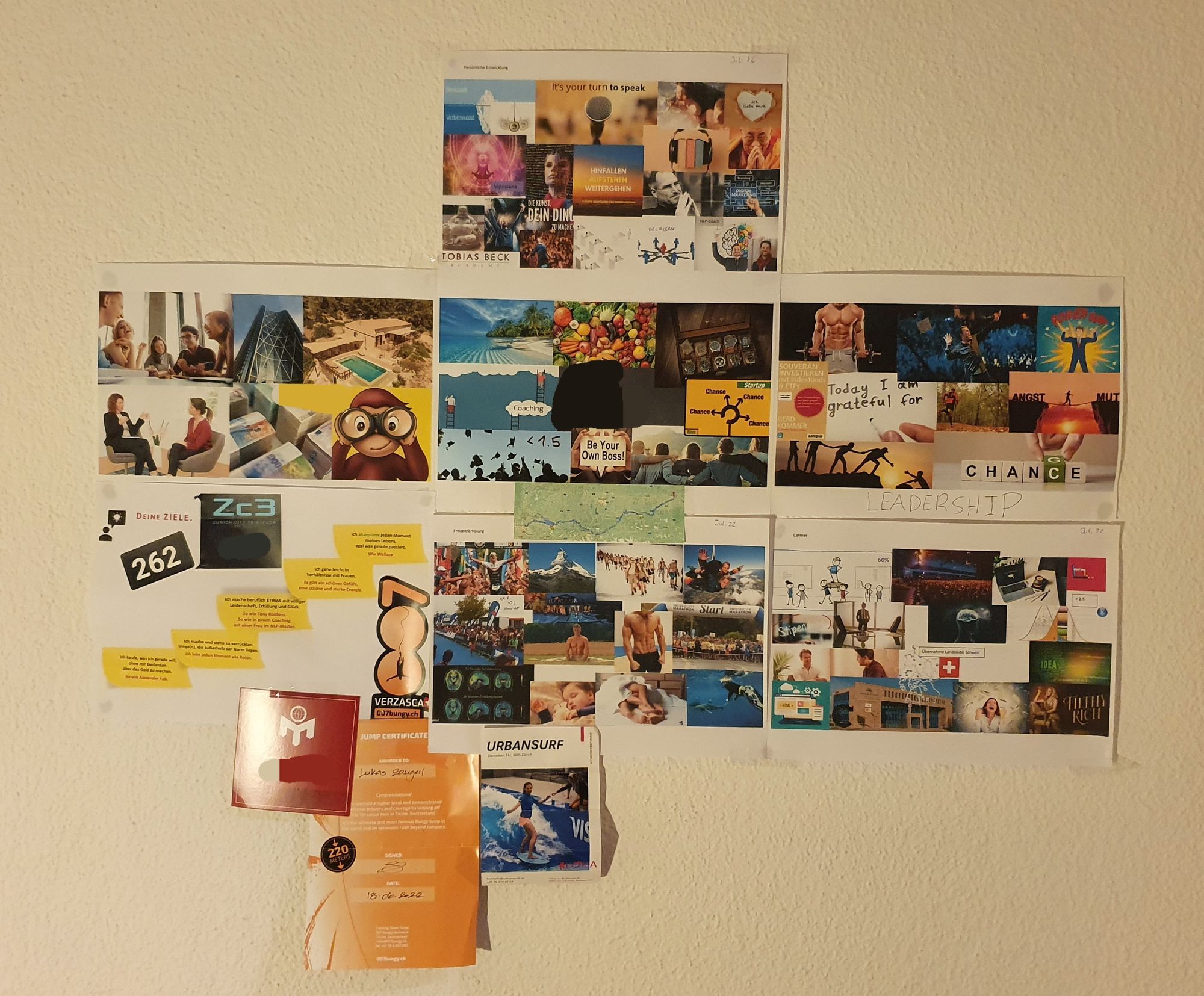
Tony Robbins Result Coaching: 7 mind-bending questions to transform your thinking
NLP is used in many areas.
Tony Robbins' result coaching promises to transform your mindset and crush your goals with the help of Neurolinguistic Programming.
"Results that exceed expectations."
"81% Improved Time Management"
"57% Increased Confidence & Decreased Stress"
"70% Increased Work Performance"
After reading the stories of former coaching clients, I was ready to schedule my 30-minute free results coaching session with a Tony Robbins result coach.
7 mind-bending questions a Tony Robbins result coach asked me to help me achieve my goals this year:
#1. When you look one year into the future, what is one goal you MUST have achieved?
#2. What precisely is your goal? " You cannot manage what you cannot measure. "
#3. How can you measure the goal?
#4. What would be better/change if you achieved your goal?
#5. What are the thoughts that keep you from achieving your goal?
#6. Where will you be in 2-3 years if you do nothing to achieve this goal? How will you feel?
#7. Why is now the right time to take the first step toward the goal?
🌈 Resilience: The Simplest Way To Overcome And Grow Stronger Out Of A Current Crisis
Not everything always goes according to plan. I have summarized the best resilience strategies from the course developed by Professor Dr. Jutta Heller, an expert in the field of resilience.
Everyone experiences a crisis at some point in their life.
I did the worst thing I could do. I locked myself up in my room and sank into self-pity.
But what changed for me was the realization that we all have a choice. And as soon as that clicked, I started to understand that overcoming this crisis wasn't that hard—I just had to get help.
Here's what I did
I took an online resilience course from Prof. Dr. Jutta Heller.
What is resilience? It is the ability to get out of a crisis mentally and physically stronger than before.
These are seven practical tips on how to handle a current crisis
- 👸 Take time for yourself. Look for a protected place in nature, at home, or on a short vacation.
- ⚖ Check whether it is good to be alone or prefer to be with someone familiar. Being together without talking will help you to heal.
- 📆 Set up a daily schedule and stick to it (getting up, meal times, active times, relaxation phases, bedtime).
- ✍ Bring your thoughts to paper - by talking or writing. Find an understanding listener who can bear your complaints and support you.
- 👍 Notice what has remained intact in the current crisis. Write down these aspects in your different areas of life (job, family, friends, hobbies, etc.).
- ⛷ Moderate physical activity is helpful, as the clarification process can slowly end.
- 🎁 Be understanding and patient with yourself. Such a process takes time.
Conclusion
In conclusion, practicing NLP on yourself can be a highly effective way to change your life. By using powerful tools and strategies, you can achieve your goals and transform yourself into the person you want to be. If you're committed to self-development, learning NLP is a great way to take your journey to the next level.Explained in 4 bullet points:
• Neuro-linguistic programming (NLP) is an approach to communication and self-development used to achieve desired goals, break negative thinking, and discover true values. It has been gaining massive popularity due to its effectiveness in curing lifelong phobias in a short amount of time.
• NLP is best learned through an NLP Trainer or coach, workshops, and seminars.
• Benefits of practicing NLP include being able to use positive language, gaining inner freedom, having greater influence on yourself and others, freeing yourself from blockages and destructive behaviors.
• Techniques for practicing NLP include: reflecting, taking action, being your own coach, storytelling, asking questions.
So, what strategies and techniques do you use to achieve your goals?
If you want to know how I achieved the goal of running a marathon and doing Europe's highest bungee jump with the help of NLP, feel free to listen to the podcast episodes How to Run a marathon (without any training) and Europe´s Highest Bungee Jump: How to expand your Comfort Zone.
Resources


Read all articles on Neuro-linguistic Programming
NLP Practitioner: How to get started with NLP
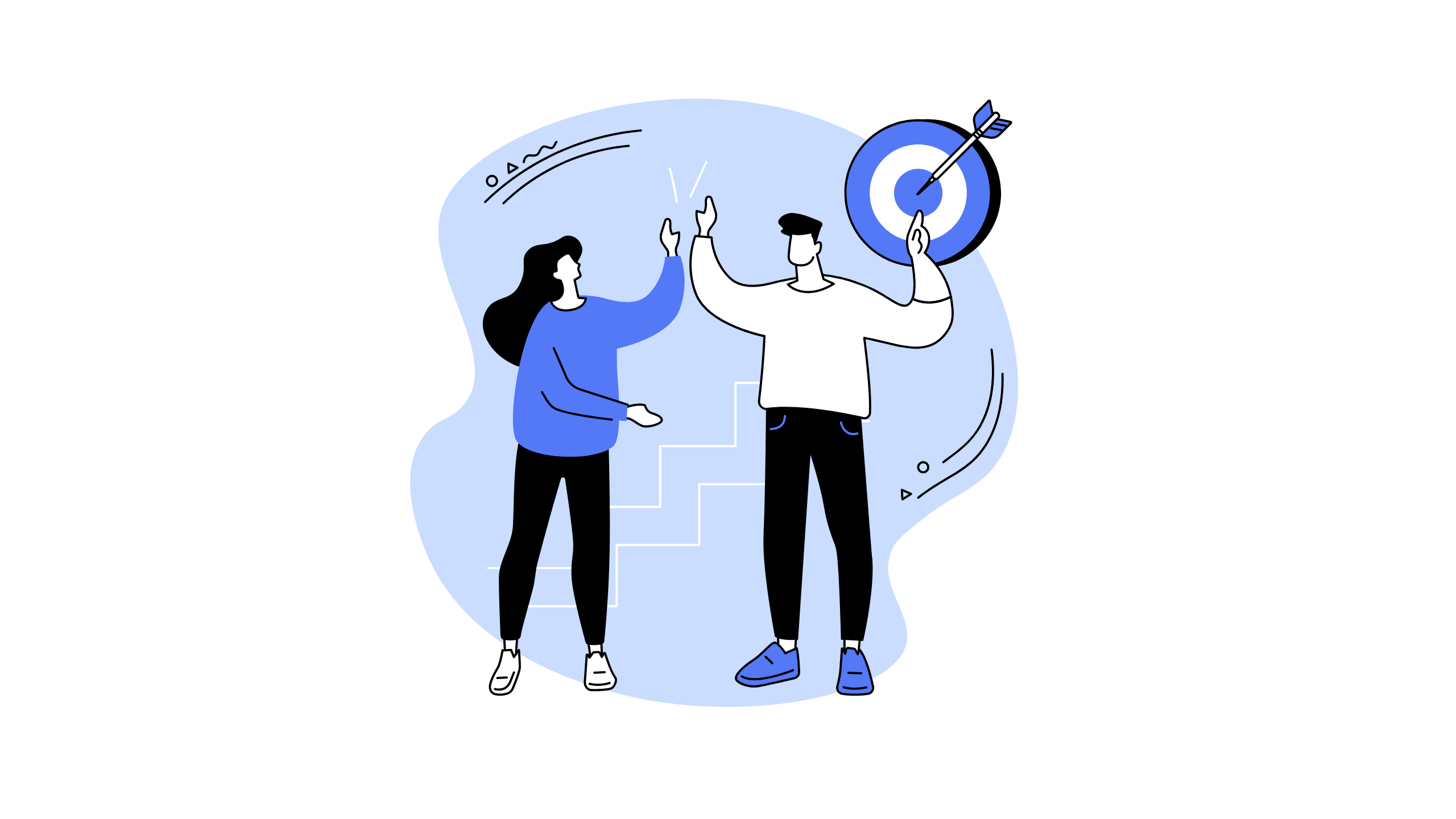
👉 8 interesting facts about NLP that not everyone may be aware of
- NLP was inspired by the work of three individuals: Milton Erickson (a renowned hypnotherapist), Virginia Satir (a family therapist), and Fritz Perls (the founder of Gestalt therapy). Richard Bandler and John Grinder, the co-creators of NLP, studied these individuals to model and replicate their successful communication and therapy techniques.
- NLP is based on the idea that our thoughts, feelings, and behaviors are interconnected and that we can change our internal experiences by changing our language and behavior.
- The field of NLP is interdisciplinary, drawing from linguistics, psychology, cognitive science, and computer science.
- NLP techniques have been used in various contexts, including therapy, education, business, sports, and law enforcement.
- Some popular NLP techniques include reframing, anchoring, rapport building, and visualization. These techniques are designed to help individuals change their thinking, feeling, and behaving patterns.
- There is ongoing debate about the scientific validity of NLP, with some critics arguing that it lacks empirical evidence to support its claims.
- Despite the controversy surrounding NLP, many individuals have reported experiencing significant positive changes in their lives due to using NLP techniques.
- NLP has been used to treat various mental health conditions, including anxiety, depression, phobias, and post-traumatic stress disorder (PTSD).
